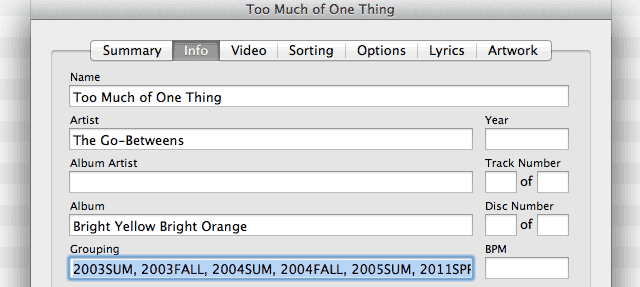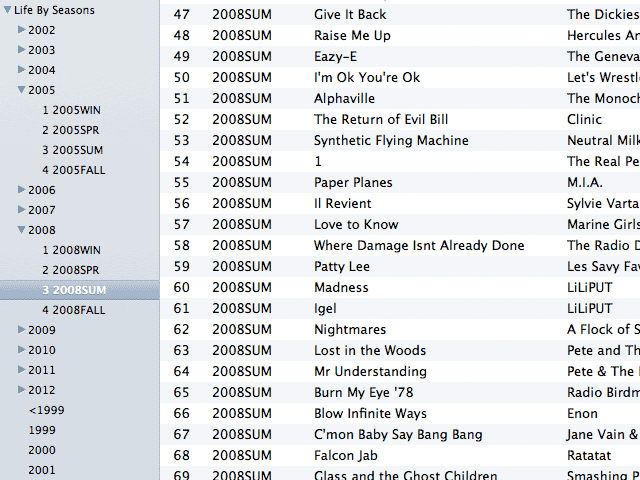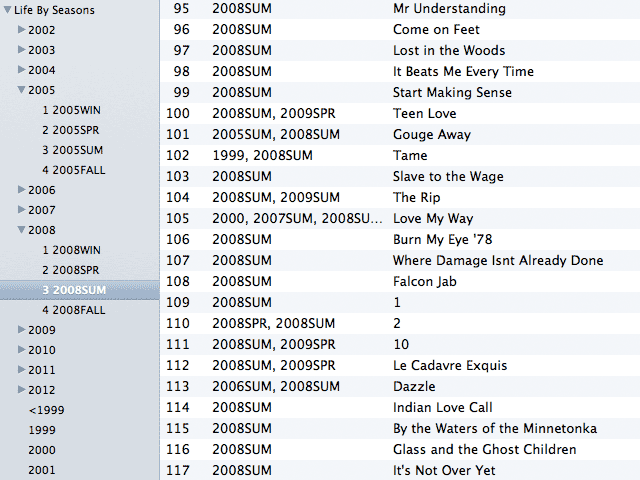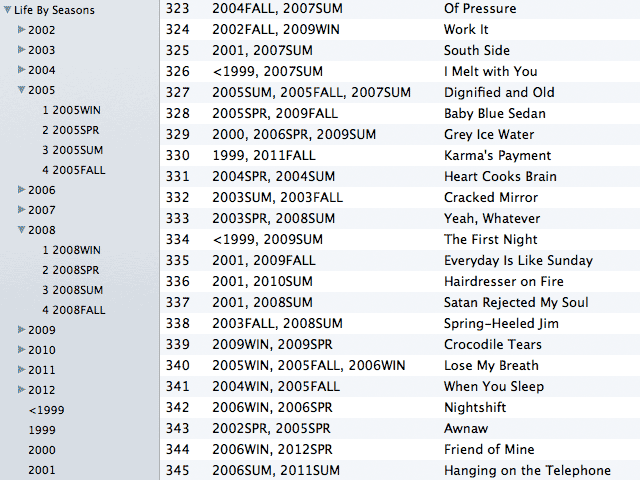I can tell you how I got from Deep Purple to Howling Wolf in just 25 moves.

Some people find an artist’s catalog to be the way they like to carve up the domain of music; most people find albums to be discrete enough. For me that unit is seasons. Seasons are inexorably tied to mood and can also be associated with life changes, especially when you’re young and all you do is school. To organize music based on artist or album or even year released is extrinsic; the music has always been about me.
Last fall, I briefly saw a psychiatrist because I no longer liked listening to music. It distressed me more than all the other aspects of my personality that I should see a psychiatrist for because listening to music and making it a part of myself makes up a large part of my identity. When cassettes were a thing people didn’t make fun of, I would record songs off the radio. When I got my first computer, a Macintosh Color Classic when I turned 9, I would record them in 8-second or 30-second clips, depending on whether I was holding down the Option key or not. As a kid, I would fall asleep with the radio on next to my pillow. I found out while I was sleeping that Jonathan Melvoin, the touring keyboardist of my favorite band at the time, had died because the radio had infiltrated my subconscious (for years I erroneously thought that I predicted it in a dream).
I was a late adopter to mp3s, as hard drive constraints and only owning devices that could play physical media made mp3s impractical. I would burn my mp3s to audio CDs and disambiguate them by marking the date on the CD. My senior year of high school was a big year for me. After retiring my beloved but limiting tangerine iBook for a TiBook (which afforded me the hard drive space) and then buying my first iPod a few months later (obsoleting my discman), mp3s finally made sense. When I transferred all my mp3 CDs back to mp3 files, I put all my songs into playlists named after the date on their respective CD. When that became too specific, I consolidated the playlists into month-year “objects.”
This is where it gets important. I kept up this habit of attributing month-years to the mp3 files in my library. Each month I maintained a playlist that contained songs I listened to that month. Eventually I noticed that iTunes had a metadata field called “Groupings,” (apparently to denote movements within classical music) so I started putting the year-month data in there because it was the only appropriate field. I was able to store comma-delimited month-year values for each song, and then create smart playlists based on the groupings field and no longer had to manually maintain my playlists. I just had to tag an mp3 with the month-year value and it appeared in the right playlist for that year and month. At some point the month-year pattern got cumbersome and I consolidated further into season-years, especially as life seemed to speed up as I got older and months became too short.

Do you remember in High Fidelity when Rob is organizing his record collection autobiographically? That’s okay, I have a clip:
That’s the closest analog to this model. Each of my season-year playlists has the emotions and experiences of that three-month moment encoded into every song it contains. I’ve inadvertently managed to create a detailed narrative of my life just from the way I ended up organizing my mp3s. If want to feel how I felt my freshman year of college, I just filter my library for 2003FALL and I get all the tracks I listened to then, all the emotions I’d experienced, and the general mood of that period in my life. Say I want to re-experience my first year in Portland, although I don’t know why I would want to live through that again. I filter my library to 2009 and get 2009SPR, 2009SUM, 2009FALL, and 2009WIN. Say I only want to experience every summer of the past ten years. I filter my library by SUM and I’m having those rich emotional experiences again.

Since my groupings are tag-delimited, I can store multiple season-year parings for songs I’ve listened to in multiple instances throughout my life. Since those songs have had more weight than a song I only listened to for one season, I created a smart playlist called Greatest Hits and it looks for any track whose grouping contains a comma, indicating more than one season. This creates an approximation of some of my favorite songs, but unfortunately doesn’t take into account the handful of songs I listened to so intensely in one season of my life that it just hurt too much to ever listen to again.

There are some caveats to this model. The metadata associated with a track file is invaluable. If I lost all my year-season pairings to all my tracks it would be like losing a diary, it would mean losing a way to get back to my history. It has me locked into iTunes, and has 40GB of my hard drive tied up with files. Unfortunately, these tags can’t easily be abstracted out of iTunes which makes any “cloud”-based or social music site not compatible with the highly personalized, completely niche, homegrown method I’ve developed. I guess this does make me a music hipster.